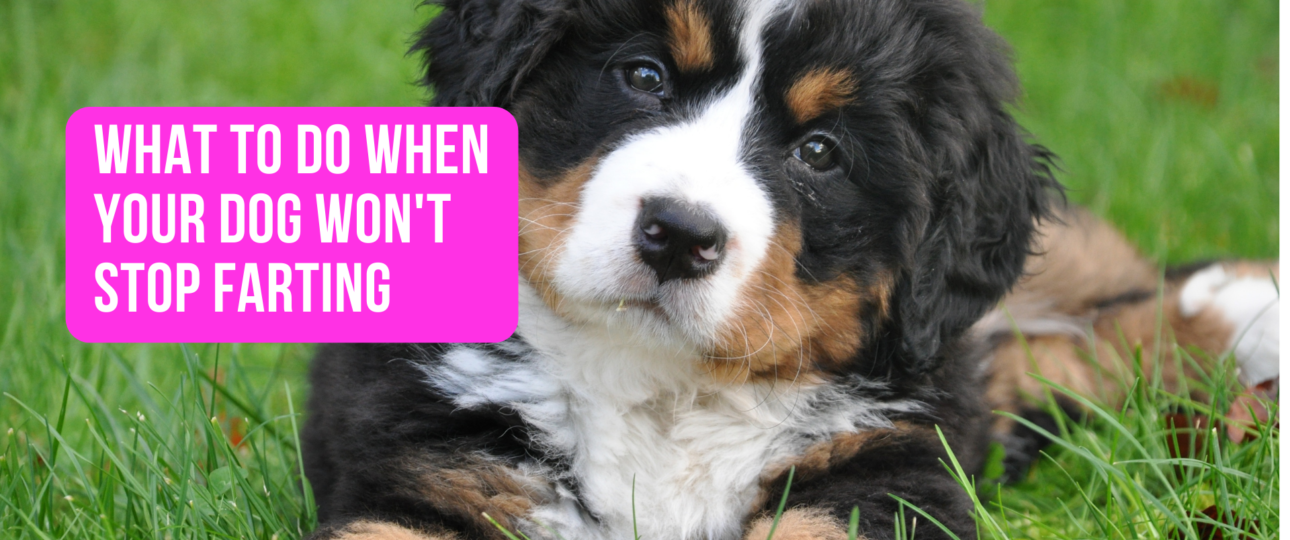Why do dogs fart? Here is the reason! Does your dog's flatulence have you gasping for air? Can one fart from your dog clear a room? Gassy dogs might be funny to some, but it's something we dog lovers can live without. Find out why some dogs fart so much and learn how to handle flatulence in your dog.
Reasons for Flatulence in Dogs
Dogs pass gas for basically the same reasons people do. Flatulence is a normal bodily function that cannot be completely stopped. However, excessive gas can certainly be lessened, and finding out the reason is the first step.
Flatulence is the result of gasses that accumulate in the digestive tract. These gasses typically get there in one of the following ways:
- Swallowing excessive amounts of air (especially from "wolfing down" food) can cause excessive amounts of gas. Remember, what goes in must come out. If your dog does not burp out swallowed air, it will come out the other end. However, flatulence from swallowed air does not usually have a strong odor.
- The normal process of digestion produces gasses in the intestinal tract. Foul-smelling gas is often caused by bacteria in the colon that aids in digestion of foods that were not completely digested in the stomach and small intestines.
- Infections, diseases and disorders of the GI tract can cause excess gas production.
- If a dog has excessive flatulence with a foul odor, the culprit is likely dietary. It may, however, be the result of an infection or illness.
How to Decrease Flatulence in Dogs
First things first: is your dog showing any signs of illness? If so, he should see your vet before you attempt to address the flatulence. Signs like diarrhea, vomiting and loss of appetite along with flatulence could mean there is an GI tract problem. Even if your dog is showing other signs of illness seemingly unrelated to the flatulence, you should still see your vet before trying to change his diet and/or add medications.
If your dog seems fine other than the gas, the next step is to make sure your dog is in overall good health. All dogs should have a thorough examination by a veterinarian every 6-12 months. If your dog has seen the vet in the last 6-12 months and received a clean bill of health, great. If not, it is best to make that routine appointment before trying to address your dog's gas yourself. You can bring up your dog's excessive gas to the vet and see what is recommended.
If your dog appears to be in overall good health, here are a few things you can change in an effort to ease his flatulence:
- Change your dog's diet. The dog food you feed might be making him excessively gassy. If you are feeding a low-quality "economy" diet full of fillers and by-products, try changing to a better quality diet made with whole food ingredients. Try a natural, holistic dog food. You might also consider feeding a homemade diet. Avoid ingredients that may cause excessive gas, such as soy, dairy, peas, beans and fruit.
- Slow down your dog's eating. You can feed several smaller meals throughout the day, or try placing an obstacle (like a ball or smaller bowl) inside your dog's food dish to slow him down. Consider trying a bowl that is designed to slow down eating, like the DogPause Bowl.
- Try probiotics. While the benefits of probiotics are debated among professionals, there is certainly no harm in trying to add more of the good bacteria to your dog's GI tract. Be sure to use a high-quality probiotic that is suitable for dogs. Ask your veterinarian for recommendations.
- Try dietary supplements. The use of Yucca schidigera and/or Zinc acetate has been known to decrease the odor of gas, but not the gas itself. Activated charcoal is also thought to reduce gas odor. Before beginning any supplements, be sure to choose a product that is labeled for use in dogs.
When making the above changes, it is best to try one option at a time in order to determine which works best. If none work alone, you can try combining methods one at a time. Remember, if at any point your dog develops diarrhea, vomiting, loss of appetite or any other signs of illness, you should see your vet.
While waiting to see if any of these methods help, one simple way you can manage your dog's gas problem is through exercise. A simple walk within 30 minutes of eating can help move those gasses along more quickly, allowing him to emit them outdoors where the odor is much less noticeable.




















